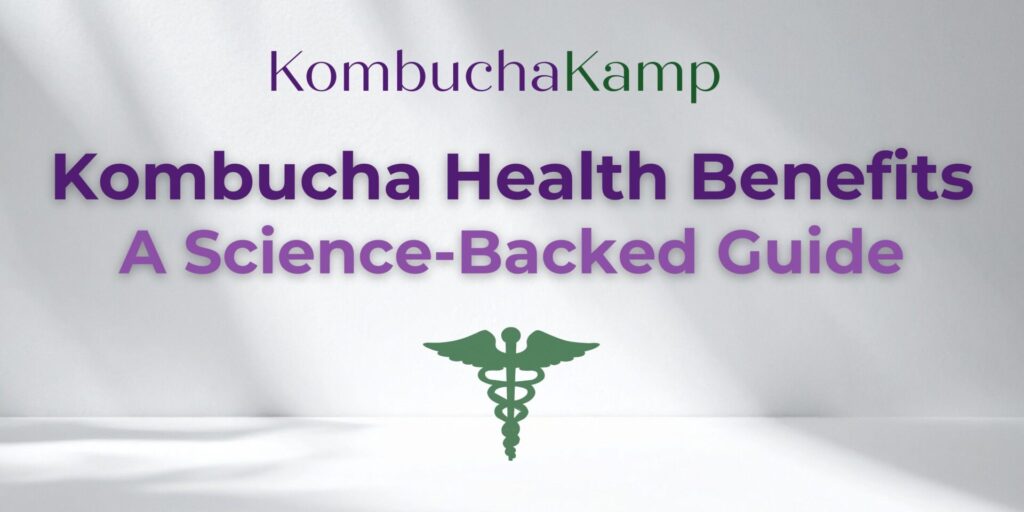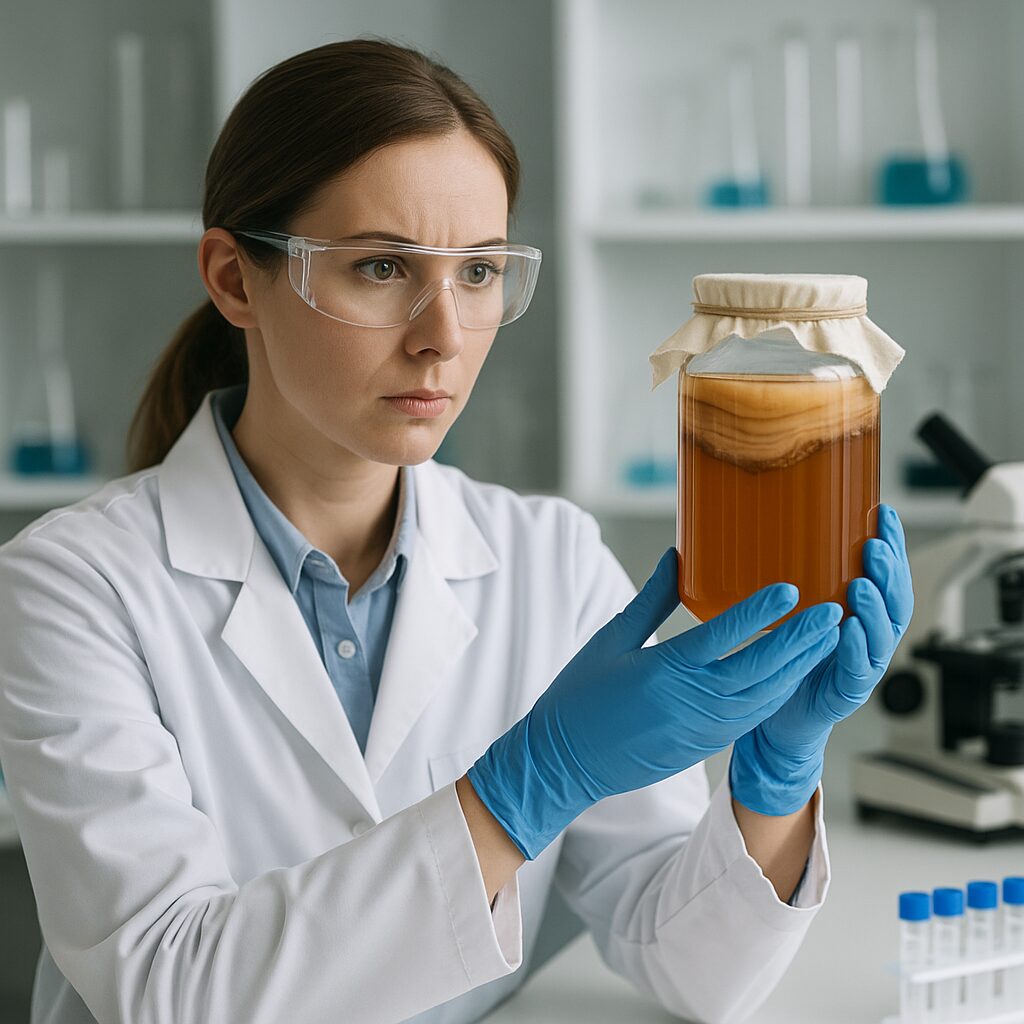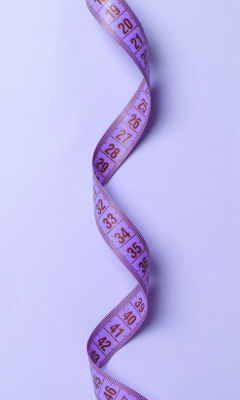Are you a Microbe Master? Take Our 8-Question Quiz and Start Brewing Today!

Whether it’s been around since 220 BC or only for a few hundred years, Kombucha’s health benefits are one of the main reasons people try this funky brew for the first time. They hear from a friend or relative that Kombucha helped with something like stomach problems so they grab a bottle from the store or find a SCOBY to try a homebrew.
Most websites say that all the support for Kombucha benefits is anecdotal. And it’s true that for hundreds of years, that’s how people passed around their health traditions. As a result, popular nicknames for Kombucha in many different languages reflect this folklore of Kombucha health benefits: “Tea of Immortality”, “Elixir of Long Life”, “Magic Juice” just to name a few.
These names are exaggerations of course. As we say, Kombucha is not panacea. It will not solve all your health problems overnight or by itself. But many people have incorporated it into otherwise healthy routines and find it’s been a great addition to their lives. So maybe you will find you love it too!
Kombucha has been brewed for thousands of years, treasured across cultures as a tangy, fizzy, feel-good tea elixir. In the last decade, it’s become one of the most popular fermented drinks in the world — and for good reason.
But what does Kombucha actually do for your health?
What is real, what is possible, and what belongs in the category of “fun myths the internet won’t let die”?
This guide breaks it down clearly, compassionately, and with actual fermentation science — so you can enjoy your booch with confidence and clarity.
Let’s dive into the real benefits, the likely benefits, and the limits of what Kombucha can (and can’t) do.
These Statements Regarding Kombucha Benefits Have Not Been Evaluated By The FDA. It Is Not Medical Advice, Nor Is It Intended To Replace The Advice Or Attention Of Heath-Care Professionals; This Information Is For Educational Purposes Only. Kombucha Tea Is Not Intended Diagnose, Treat, Cure Or Prevent Any Disease And Nothing Here Should Be Taken As A Claim Of Specific Kombucha Benefits For Any Person. All Information Is Intended For Your General Knowledge Only And Is Not A Substitute For Medical Advice Or Treatment For Specific Medical Conditions. We Can Not And Do Not Give You Medical Advice. Full Disclaimer Here.
Here’s the honest truth: Kombucha is a fermented functional beverage, not a miracle cure. It contains:
These compounds can support digestion, energy, metabolic balance, and general well-being — but Kombucha is not a replacement for medical treatment, and we won’t claim it cures anything.
You will feel the difference in your body, but it’s because your microbiome, gut, and nervous system love fermented foods. In fact, more than 70% of the human immune system is located in the gut, so supporting this vital piece of our health is crucial to living a healthy life.

A brief review of the research done in the 21st century shows many promising potential benefits from consuming Kombucha that line up well with anecdotal reports. None of these are FDA-approved statements or based on double-blind human trials, we are simply referencing a variety of scientific studies carried out around the world:
Below are the benefits most people experience, backed by known effects of fermented foods, organic acids, and tea compounds. These are the benefits that are realistic and observable.
Gentle, natural support for microbiome harmony.
This is the #1 reason most people fall in love with Kombucha.
Why it helps your gut:
Kombucha naturally produces acetic, gluconic, and glucuronic acids during fermentation. These acids help maintain a healthy digestive environment and make food feel easier to break down.
Raw Kombucha contains living cultures of bacteria and yeast that contribute to microbiome resilience.
Many people report that Kombucha feels “light,” “cleansing,” or “smoothing” to the digestion.
Unlike intense probiotic supplements, Kombucha’s support tends to be consistent and steady.
If you’ve ever felt your gut “wake up” after a few days of drinking Kombucha, this is why.
Kombucha begins as tea — then fermentation supercharges it. This is demonstrated by a 2024 study exploring fermentation’s ability to enhance the benefits of botanical compounds. (Ref: https://pmc.ncbi.nlm.nih.gov/articles/PMC11381286/)
Tea is naturally rich in antioxidants like catechins, theaflavins, and polyphenols. When Kombucha ferments:
Antioxidants help your body combat everyday oxidative stress — the normal wear-and-tear of living life in a modern world.
People often report:
Again, Kombucha isn’t medicine — but your immune system appreciates fermented foods.
A clean, stable lift without the crash.
Kombucha provides a unique “energy profile” because it contains:
The result?
Many people say Kombucha makes them feel:
“cleanly energized,” “clear,” “better in my body,” or “happier and lighter.”
That’s the synergy of fermentation + tea.
We often hear concerns from people who struggle with insulin sensitivity and are understandably concerned about the sugar content of Kombucha as well as how to minimize it. Interestingly, a 2023 study showed that regular Kombucha consumption helped to control fasting blood sugar in people with diabetes… a fascinating find that further supports the incorporation of fermented foods as a foundational part of the Western diet.
Here are the facts.
Kombucha’s organic acids — particularly acetic acid — are known to:
This is similar to how vinegar supports post-meal comfort and blood sugar balance — but Kombucha is far tastier.
Many people find:
The key is finding your ideal Kombucha style: lightly sweetened, homemade, or raw commercial.
Kombucha contains gluconic acid and glucuronic acid (yes, the famous one internet bloggers love to exaggerate). These organic acids support your body’s natural detox systems by:
It’s not a “liver cleanse.”
It’s not a “full-body detox.”
It simply supports your body’s own detox processes — the ones it’s already doing, 24/7.
Newer lab studies have begun to demonstrate possible liver protective benefits (in rodent models) which makes this area something potentially very exciting and ground-breaking when it comes to our favorite functional, funky beverage!
(Kombucha contains trace alcohol. Personal decision. Learn more on this here.)
(Consult provider. Not the time to experiment. See our page on this here.)
(Kombucha is acidic and tea-based. Check out our article on Caffeine.)
(Always consult a clinician.)
(Small servings. Parents decide. Avoid highly carbonated batches.)
In many ways, homebrew wins — but both are great for different reasons. When choosing which method is best for you, it is always good to keep in mind what goals you are trying to accomplish with your Kombucha. For us, if we are recommending options to help people replace destructive habits like soda consumption, we always recommend starting with a raw, store-bought Kombucha in order to build an understanding of how your body will react to the new ferment as well as whether you even like the flavor profile. Once you’ve found a flavor profile you enjoy, Kombucha Kamp is here to help you nail the process to reach your desired results every single time. For insights into what the process for making Kombucha at home looks like, check out our How to Brew Kombucha Complete Guide.
Short answer:
It supports habits that support weight loss — but it isn’t a weight-loss drink.
Because Kombucha can:
…it can fit beautifully into a wellness plan.
But, as we’ve said before: Kombucha is not a panacea so don’t expect miracles!

Generally yes, for most people — when enjoyed in moderation.
Start with 4–6 ounces and increase as desired.
Many people feel improved digestion and gut comfort due to organic acids and live cultures.
Fermented foods can support the body’s natural resilience, but Kombucha is not an anti-inflammatory drug.
The antioxidants and gut-supportive properties contribute indirectly to overall wellness.
For most people, yes — unless sensitive to caffeine, acidity, or trace alcohol.
Kombucha isn’t a cure-all, but it is a deeply supportive, holistic, feel-good beverage that works with your body rather than against it.
It’s alive.
It’s nourishing.
It’s uplifting.
And for many people, it becomes a daily ritual they look forward to — a small moment of care, clarity, and connection.
Whether you brew your own or pick up a bottle at the store, Kombucha’s health benefits unfold gradually over time, supporting:
Your body will tell you what works for you — Kombucha just gives it a gentle nudge in the right direction.